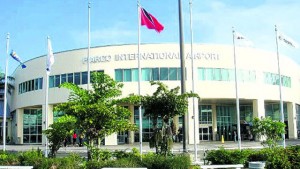
Piarco International Airport
PORT OF SPAIN, Trinidad (CMC) – The Trinidad and Tobago Government says it had prevented 12 Jamaicans from entering the island late last month because they were “deemed likely to become charges on public funds”.
The Ministry of Foreign Affairs in a statement said that Foreign and Caricom Affairs Minister Dennis Moses met with Jamaica’s High Commissioner to Trinidad and Tobago, David Prendergast on Tuesday to discuss the issue.
“All related issues were discussed in an open, frank and courteous fashion befitting the strong relationship between both countries,” the statement noted.
Last month, the Jamaica Government said it was probing allegations that two of their nationals were ill-treated on their arrival here and reminded Jamaicans that there is a Caricom (Caribbean Community) Complaints Procedure which may be used to ensure that nationals who have been denied entry, detained or mistreated at the ports of entry of other Caricom states.
Jamaica said it was advising its nationals that they could lodge complaints with the CARICOM office established for that and may also file a formal complaint with the ministry on return to Jamaica.
“The complaint forms are available on arrival at the airports in Jamaica. Once a complaint is received, an investigation is conducted with the relevant authorities in the CARICOM country concerned; and Jamaicans may also make reports directly to the Ministry of Foreign Affairs and Foreign Trade,” the statement added.
But Port of Spain said that Moses had received a report on the refusal of entry of the 12 Jamaicans who arrived at Piarco International Airport on Caribbean Airlines flights BW459 at 7:53 pm and BW455 at 8:43 pm and departed for Kingston, Jamaica at 7:50 am on March 22.
It said that Section 8 (1) (h) of the Immigration Act denies entry to persons who may be deemed likely to become charges on public funds.
“All of the passengers were denied entry in accordance with this Section,” the statement said, adding “in keeping with Section 21 of the Immigration Act, both the passengers and Airline were duly notified and served with the relevant notices”.
It said that “at approximately 11:00 pm, the passengers were taken into the care of the airline – Caribbean Airlines Limited, to await an outward-bound flight to Kingston, Jamaica, on Caribbean Airlines flight BW414 at 7:50 am on 22nd March, 2016.
“Sections 32 and 34 of the Act outline the responsibility of the airline when passengers are refused entry. Section 34 (c) specifically mandates the company to treat all such persons in a humane manner and to provide them with meals.
“Accordingly, they were taken to the Customs and Excise section of the airport for a baggage check, then escorted upstairs to the departure lounge area where they remained in the presence of the security company contracted by Caribbean Airlines.”
The Ministry of Foreign Affairs said that the Jamaicans “were served a meal and drinks and were provided with blankets by representatives of the airline in keeping with usual airline procedure.
“They had access to a water cooler and were escorted to the washroom facilities on the lower level of the terminal building upon request, as repairs to those facilities in the departure lounge were then being undertaken.
“All departing passengers are directed to this facility on the lower level pending the completion of the repair works,” the statement added.
In 2013, the Trinidad-based Caribbean Court of Justice (CCJ) awarded Jamaican Shanique Myrie pecuniary damages in the sum of BDS$2,240 (One BDS dollar = US$0.50 cents) and non-pecuniary damages to the tune of BDS$75,000 after she had taken the Barbados Government to court alleging that when she travelled to that Caricom country on March 14, 2011 she was discriminated against because of her nationality, subjected to a body cavity search, detained overnight in a cell and deported to Jamaica the following day.
Myrie also claimed that she was subjected to derogatory remarks by a Barbadian Immigration officer.
